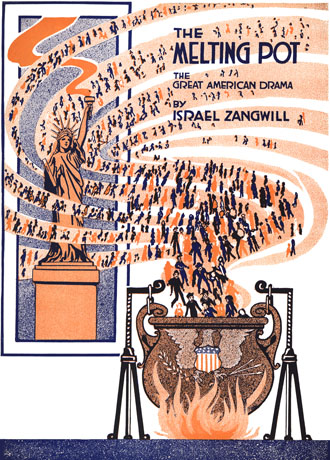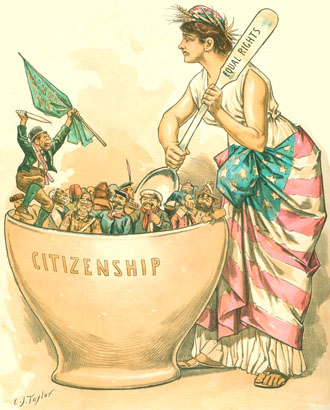“What we need is a great big melting pot, big enough to take the world and all it’s got”, sang the UK pop group Blue Mink in 1969 and with the release of that single,
Melting pot, songwriters Cook & Greenaway popularized a term in Britain that had been ghosting around the cultural history of the Western World since the eponymous play by Israel Zangwill exposed New Yorkers to the dream of creating a new race of men in America in 1908. In truth, the idea had been circulating for even longer, as an undercurrent in European letters and literature emerging from the new continent. As far back as 1782, Hector St. John de Crevecoeur (wonderful name!) wrote in his
Letters from an American farmer:

“He becomes an American by being received in the broad lap of our great Alma Mater. Here individuals of all nations are melted into a new race of men, whose labours and posterity will one day cause great changes in the world...”

However, it is doubtful whether even he or anyone else at the time was ready to consider all the implications. Indeed, nearly two centuries after those words were written, the release of a 1970 US cover version of Cook & Greenaway’s song by soul singer Mickey Murray was met with the faintest of applause and a singular lack of airplay. The idea of turning out “coffee-coloured people by the score” was going a bit too far for the average, even hippy, Joe of the period. Fortunately for Cook & Greenaway, they were later able to “teach the world to sing in perfect harmony” with somewhat more success … so much success that they could even “buy the world a Coke” with the proceeds.

| |



Theatre programme for The Melting Pot (1916),
"the great American drama" by Israel Zangwill, 1904. |
The crucible idea of melting down races and cultures into one human family took on new life and also faced new opposition when it became clear in the mid twentieth century that (oh shock, oh horror) this would include not just those of European ancestry, but indigenous and African populations too. The WASP and Southern horror of miscegenation, a word actually coined in 1863 to describe inter-racial mingling, created artificial access thresholds to the melting pot metaphor: the infamous “Jim Crow” laws. These and other limitations, economic and educational, already prevalent at the end of the 19th century, have taken over a hundred years to diminish significantly. The journey from the idea that maybe the melting pot shouldn’t contain too many southern and eastern Europeans (an Anglo-Celtic-Gallo-Germanic pot was the largest model being considered by most contemporaries of Zangwill) to the notion that Native Americans, as well as those of Arab, African or Asian descent might also find a place therein, is a road yet to be completed. We are still a long way from turning out “coffee coloured people by the score”.

Part of the problem came from within the melting pot itself. Already in the 1960s, fear of assimilation and absorption into a prevalent, white culture was worrying leaders of the civil rights movement. The slogan “Black is Beautiful”, intended as a simple statement of racial pride, was soon being interpreted by some as non-inclusive of brown or café-au-lait options. And when the blackest of black cultural words, “ebonics”, was coined for the study of African American history, it was clear to everyone that the melting pot was no longer a desirable goal. Ethnicity had arrived. The multicultural mosaic or salad gradually replaced the melting pot. More recently, political correctness has begun to demand the same degree of dignity for every culture and refuses any kind of levity on the issue. These are tough time for comedians, whose best jokes are now considered sexist, racist, ageist, heightist, or otherwise culturally insulting. The main effect of political correctness on the bright tapestry of pluralism has been to dull its colours and make many people afraid of celebrating their differences for fear of being considered exclusivist or accused of cultural insensitivity. The bell of liberty is wrapped securely in felt, that none be offended by her sound. If my freedom ends where yours begins, this is also true of my identity and its expression, so shut up!

In the last few years, the prevalent multicultural model of a salad or mosaic, a flower garden or market place, has also suffered greatly from the unexpected virility of its various ingredients. People arrive in a country with their prejudices intact and communicate them to the next generation. Each new addition to the urban neighbourhood brings its own version of history, regards with suspicion the people it is forced to rub shoulders with as well as the motives of its host. Each brings its own kind of problems, its own kind of crime and its own set of solutions, many of which are not palatable to the host nation’s traditional majority. The mosaic model gets dangerously fragmented; there is simply not enough sauce, whether culturally or economically, to unite or integrate the salad into a single purpose. This has gone so far in Europe, that no less a figure than Chancellor Merkel has famously pronounced the multicultural experiment a failure.

| |



"The Mortar of Assimilation and the One Element
that Won't Mix", cartoon by C. J. Taylor.
Puck magazine, June 26, 1889. |
But in America, where the salad of multicultural pluralism swims in a sauce of Anglo-Saxon origin and lies in a bowl with distinct national and conceptual borders, these boundaries, more than race or culture, still tend to define American identity, at least as viewed from the outside. Thus the risk that the 21st century might be historically evaluated as Asian in character has been countered by the US with two powerful waves, the first has been a reassertion of American national and political exceptionalism, over and above any internal idea of either assimilation or pluralism, while the second has been the aggressive exporting of the US cultural and economic model into the Chinese heartland of the new Asian identity. If China is the future, then the US is going to make it as American as possible.

Perhaps the melting pot will be well served in the long run (though it saddens me to say so) by this flattening effect of economic globalism, for it may cause us to ultimately forget or disregard our roots. As the commercial world loses a dimension, so does the cultural one it forms and is formed by. Unfortunately, this means that we may not only have coffee-coloured descendants, but also rather dull ones. Somehow, even in the face of extremism, nationalism, tribalism and other kinds of cultural exclusivity, we need to keep alive the melting pot ideal without letting it destroy our individual or group inheritance. This seems to be something we humans grasp at quite a deep, even subconscious level.

To this end, we naturally seek out that which makes us exclusive, even while we become more like one another in the homogenous, flat world of capitalist culture. Our beliefs have become useful aces up the sleeve in this game of exclusivity. Religion, which was intended to unite us, has proved far more effective in recent decades as a form of branding to mark our lack of assimilation. One religion, above all others, stands out in this respect. As the dialogue of the right and centre in Europe becomes increasingly Atlantic and Christian (even without wearing the label), the dialogue of the left becomes increasingly Mediterranean and Islamic, thus traditional Black vs White racism is gradually disappearing to be replaced by Islamophobia. Islam has become the new, socially acceptable surrogate for racial slurs and tensions in most European nations, even as it has become a viable, parlour form of “racism” for both whites, blacks, Hispanics and Asians in America. One is reminded of the Japanese (later on also the Koreans and Vietnamese), who were pilloried as “dirty yellow monkeys” and “kooks” by black, white and Hispanic US Marines alike, as a way to sublimate the racial tensions latent in their own units.

Islam, it must be said, has done a great deal to make its own bed here. By resisting assimilation and even integration – consistently undermining the melting pot with restrictive marriage laws under which Muslim men may marry infidels, but Muslim girls must marry within Islam – by rejecting all attempts at religious relativism, by refusing to condemn slavery, by being broadly acceptant of the notion of Arab superiority over other Islamic peoples, by being openly homophobic in a sexually tolerant culture, and by being unbending in their refusal of the capitalist democratic flat world model, Islam has placed itself in the firing line. This situation, doubtless intolerable for most Muslims, who just want a quiet life, is nonetheless bread and butter to many others, who profit shamelessly from stoking the flames rather than doing anything to quench them.

Yet the melting pot will win in the end. It is inevitable. There can be no avoidance, over centuries, of the reality of inter-cultural mingling. I was recently invited to speak on the subject of Children’s Rights in a local Primary School specialized in English Immersion. Foremost among those rights is the right to an identity, a name, a nationality and appurtenance within a cultural matrix. This context is essential for our sense of self as well as our legal status as citizens. I wanted to have some idea of the cultural diversity within these classes of roughly twenty to twenty five children aged from eight to twelve. I was astonished to find, that although nearly all held Belgian nationality, none were “Belgian” in the classic sense of the word:
having two Belgian parents, themselves the offspring of Belgian parents. Numerous were the Italian, Polish, Armenian, Russian or generically “American” grandparents, numerous were the Moroccan, Algerian or Portuguese parents. Mixed parents were in a vast majority. Mixed grandparents were the norm. The children were, for the most part, an attractive (sometimes stunningly so) and infectiously charming crowd, well aware of their international character and clearly proud of it. We may have to stir the melting pot “for a hundred years or more”, but we’ll definitely get our coffee-coloured people and, after another few generations, they will be utterly unconcerned about how they got here.
©
Edwin Drood, December 2013
Top illustration: "Uncle Sam's Thanksgiving Dinner",
Harper's Weekly, November 20, 1869.
Letters from an American Farmer by J. Hector St. John de Crèvecoeur is available
as a free e-book at Project Gutenberg:
gutenberg.org/ebooks/4666
Israel Zangwill's play
The Melting Pot is also at Project Gutenberg:
gutenberg.org/ebooks/23893